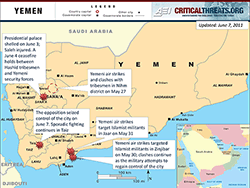 |
The Yemeni state exerts little control outside of the capital. The political crisis in Sana’a may hasten the fragmentation of the state.
Control of key southern cities remains contested. Yemeni security forces have been unable to defeat militants in Zinjibar, the capital of Abyan governorate. Clashes killed at least seven soldiers and fourteen militants over the weekend. Local authorities closed off the highway between Abyan and Aden in south Yemen. A shootout in Lahij governorate killed two soldiers.
Hundreds of thousands of Yemenis protested on Friday. The largest of the protests took place in Sana’a. Clashes between security forces and tribesmen protecting protestors occurred in Taiz.
Yemeni clerics and tribal leaders have called for a transition of power. A circulated statement read, “Saleh was injured seriously during the assassination attempt on his life. We call on Saleh to hand over powers to his vice president Abdu Rabu Mansoor Hadi, to save the country from further clashes and bloodshed.” Sheikh Abdul Majid al Zindani, a U.S.-designated terrorist, was among the signatories. Elections would be held 60 days following a transition of power. Al Islah (Reform), an Islamist party, currently leads the political opposition.
The loss of government control over key cities throughout Yemen is an indicator that the state is undergoing fragmentation. The country also remains at risk of armed conflict. The current situation has increased al Qaeda’s operating space in Yemen.
If you would like to receive these updates by email, please sign up here.
